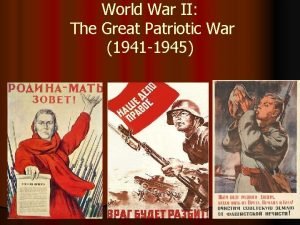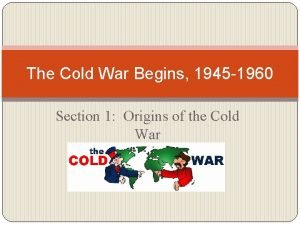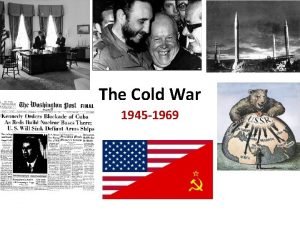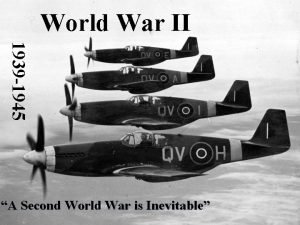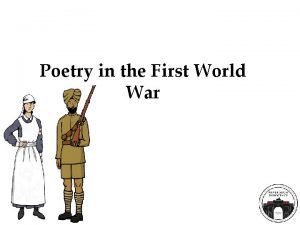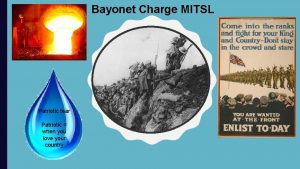GREAT PATRIOTIC WAR 1941 1945 VAREGINA DARIA HOW







- Slides: 7

GREAT PATRIOTIC WAR 1941 -1945 VAREGINA DARIA

HOW DID IT START? • Early on Sunday morning, June 22, 1941, Nazi Germany and its allies launched a military strike of unprecedented force against the Soviet country. • The primary task for the Soviet government was to form military and political management bodies capable of effectively directing the armed struggle and organizing the work of the front and rear.

From the first days, using the surprise factor, the 5 -million-strong German army in the main directions was 3 -4 times superior to the Soviet troops, quickly moved forward and by September 1941 began the blockade of Leningrad, captured Kiev and reached the approaches to Moscow. Three main battles The battle of Moscow. The first major battle was the Battle of Moscow. From September 30, 1941 to April 20, 1942. The battle of Kursk. Completed a radical change in the war Battle of Kursk (July 5 -August 23, 1943). Stalingrad battle. The battle of Stalingrad (July 17, 1942 – February 2, 1943) was decisive. It marked the beginning of a radical change in the war.

THE END OF THE GREAT PATRIOTIC WAR. • The Nazi bloc broke up. Hitler's troops were driven out of Italy and Belgium. • In January 1945, Soviet troops began the Vistula-Oder operation, completed the liberation of Poland, and reached the approaches to Berlin. • In April of the same year, Soviet troops launched a decisive offensive on Berlin. • As a result of the 23 -day operation, Soviet troops defeated the Berlin grouping of enemy troops and took Berlin by storm on may 2. • On may 9, Soviet troops entered Prague. The German command capitulated, and the Great Patriotic war ended victoriously.

THE WAR AFFECTED EVERY FAMILY… Alexander Filippovich Budnikov (1910 -1995) Called to the front in 1943. He was assigned to the 152 division of the 28 th Army. Western Belarus, the first Belorussian front, fought as far as Poland, Vyshkovo. During the capture of Konigsberg, he was seriously wounded on April 25, 1945. He was a gun commander with the rank of senior Sergeant. He was seriously injured: in the legs, head, arms, chest, back, more than 28 wounds, amputated leg. There were splinters in the head, chest, arm. Medals: "For military services“ "For the victory over Germany" Order of the 2 nd degree Order of the Patriotic war Medals for 20, 30, 40 years of Victory

My favorite war movie «And the dawns are quiet here. . . » The main events of the film take place in 1942 during the great Patriotic war in Karelia. At the railway junction in the rear of the Soviet troops are stationed two sections of a platoon of anti-aircraft gunners. To the commandant of the road, Sergeant Fedot Vaskov (former intelligence officer, veteran of the Finnish war), dissatisfied with the behavior of soldiers (in particular, drunkenness and attraction to the opposite sex), send a non-drinking contingent in the face of female volunteers, many of whom have just finished school. Being in an unauthorized absence, one of the girls, the commander of the Department Rita Osyanina, finds two German saboteurs in the forest. Returning to the platoon's location, she reports this to the foreman, who, after reporting to higher management, is ordered to neutralize the enemy. Petty officer Fedot Vaskov, soldiers Zhenya Komelkova, Rita Osyanina, Lisa Brichkina, Galya Chetvertak and Sonya Gurvich act to intercept the Nazis, whose possible target is the Kirov railway. They set up an ambush, but not two, but sixteen saboteurs come out of the forest. Vaskov's squad enters an unequal battle with the Germans. Reinforcements do not come — Lisa, who was sent by Vaskov to his own, is drowning in the swamp. The girls die one after the other, even though the foreman tries to protect them as much as possible. He is the only survivor Vaskov. Wounded and almost unarmed, he takes the remaining saboteurs captive, led by the commander. After demobilization, Vaskov adopts Rita Osyanina's son. Thirty years later, Vaskov and his adopted son, who became a rocket officer, come to these places and install a memorial plaque in the area of the death of girls-anti-aircraft gunners.

TAKE CARE OF YOUR LOVED ONES AND DO NOT FORGET THE HEROES WHO GAVE THEIR LIVES FOR THE WORLD ABOVE OUR HEAD!
